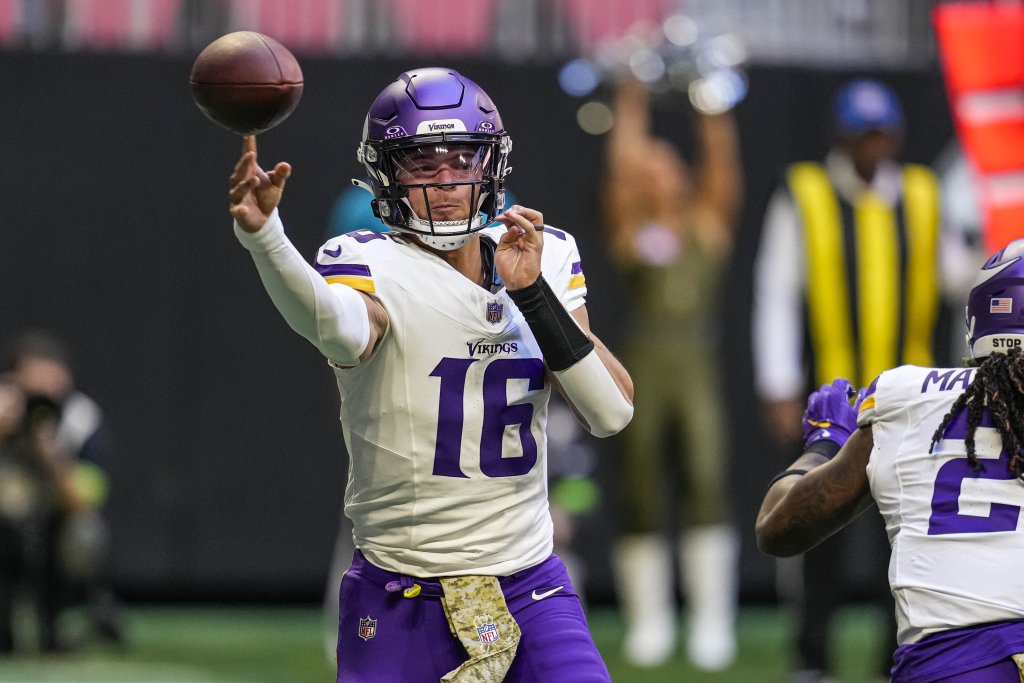Minnesota Legislators Eyeing Sports Betting Yet Again
by Robert Linnehan in Sports Betting News
Updated Jan 25, 2024 · 11:33 AM PST
Nov 5, 2023; Atlanta, Georgia, USA; Minnesota Vikings quarterback Jaren Hall (16) passes the ball against the Atlanta Falcons during the first quarter at Mercedes-Benz Stadium. Mandatory Credit: Dale Zanine-USA TODAY SportsMinnesota legislators are against preparing to look at sports betting legalization in 2024One bill will be introduced on the first day of sessionMinnesota Tribes and horse tracks are still at odds over sports betting
Death, taxes, and Minnesota legislators exploring the possibility of sports betting legalization.
State legislators are again preparing to move forward with Minnesota sports betting legislation, but several hurdles need to be cleared before any bill has a chance at approval when the legislative session begins on Feb. 12.
Namely, Minnesota Tribes and state racetracks still cannot find common ground on the best way to share sports betting and a solution may not be reached before the 2024 legislative session ends in May.
Minnesota Sports Betting Act 2.0
Sen. Jeremy Miller (R-Winona) recently unveiled his Minnesota Sports Betting Act 2.0 (SC0789), which will provide retail and online sports betting licensing opportunities to Minnesota’s 11 tribal nations and allow state racetracks or professional sports stadiums to operate retail sports betting on their premises.
Miller plans to introduce the bill during the first day of the Minnesota session.
The two state racetracks and professional sports stadiums cannot hold licenses of their own, but will be able to partner with a tribe to offer retail sports betting at their facilities.
“Minnesota continues to miss out on what is now a $100 billion industry,“ Miller said in a press release. “So far, 38 other states, plus Puerto Rico and Washington, D.C., have already legalized sports betting. This updated proposal combines ideas from my original Minnesota Sports Betting Act along with provisions from other sports betting bills that were introduced last session. It also includes ideas brought forward by constituents and stakeholders. The goal of this proposal is to bring folks together to work toward a bipartisan solution to legalize sports betting in Minnesota. I strongly believe we can get it done this year.”
His bill sets a 15% tax rate on sports betting revenue and will provide for charitable gaming tax relief for local charities, attract major sporting events to the state, boost horse racing, provide problem gambling resources, support youth sports, and facilitate athlete education programs.
According to the act, 15% of sports betting tax revenue would be appropriated to the Minnesota Racing Commission for grants to be awarded to licensed racetracks.
Where sports betting legislation has faltered over the past several years is a fundamental disagreement between state racetracks and state tribes on who should control sports betting. Minnesota Tribes believe they should have sports betting exclusivity in the state, as do Minnesota professional sports teams, but racetracks believe they should also be allowed to hold sports betting licenses.
Several 2023 Legalization Attempts
In 2023, Sen. Matt Klein (DFL-53) proposed several amendments to a sports betting bill, SF 1949, during a Senate State and Local Government Committee hearing, one of which would have sent 30% of the state’s sports betting tax revenues to a newly created fund to support Minnesota’s horse tracks.
Despite the proposed solution, representative for both horse tracks in the state, Running Aces and Canterbury Park, thanked the senator for including the amendment but did not support the changes during a Senate State and Local Government Committee committee hearing in May.
That would be as far as the bill would travel.
Rep. Zack Stephenson (DFL-Coon Rapids) also introduced a sports betting bill, HF 2000, in early March 2023. His bill, like Klein’s, gave Minnesota tribes exclusive control over retail and online sports betting in the state. Representatives for the horse tracks opposed this bill as well, citing the potential damage sports betting would do to the horse racing industry in Minnesota.
During a public hearing, Tracie Wilson, CFO of Running Aces, said it was “essential that the state’s two race tracks be treated fairly with respect to any sports betting expansion.”
“Running Aces will need to find other sources of revenue to offset the lost revenue with the current version of the sports betting bill. Sports betting will result in a significant loss of revenue for Running Aces. The tracks stand to lose revenues that are necessary to sustain the entire operations in order to support horse racing,” she said.
Without all parties on the same page, or a solution found between the tribes and the racetracks, it’s unlikely that Minnesota will have sports betting anytime soon.


